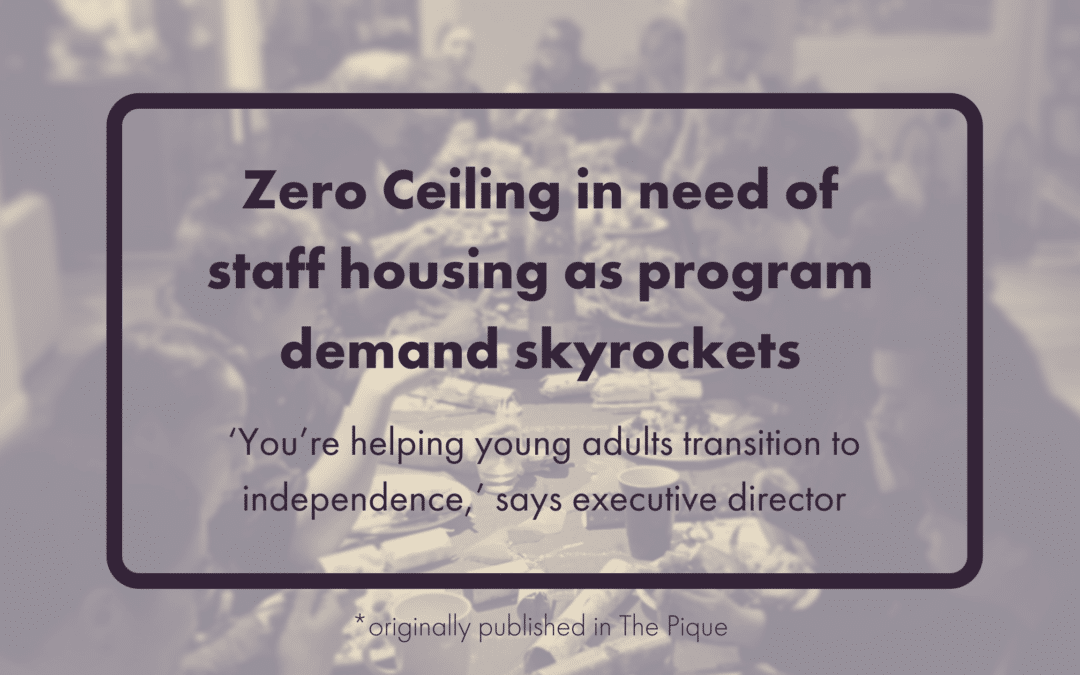This article Whistler’s Zero Ceiling in need of staff housing as program demand skyrockets originally appeared in the Pique Newsmagazine on November 15, 2020. It was prepared and written by Brandon Barrett. View the original.
Whistler non-profit Zero Ceiling, which helps under-housed youth transition to self-sufficiency through supportive employment and housing, is on the lookout for staff accommodation as demand for its main program has skyrocketed throughout the pandemic.
“It’s the longest waitlist we’ve had in years,” said co-executive director Sean Easton of the organization’s Work 2 Live program, which connects formerly homeless youth to a job and housing in the community for a year, as well as supporting graduates as they transition to the next phase in life.
Zero Ceiling recently received federal funding to secure COVID-friendly accommodation, a six-bedroom unit with a caretaker suite. But with its Work 2 Live program expanding from eight to 10 participants this year, the organization is hoping to land a four-bedroom unit that would house its female participants.
“What we’re looking for is either a detached or townhouse-style home,” Easton said. “We want something that still feels very homey and is comfy and clean, but we don’t have to be up in Kadenwood.”
“We’re a longstanding organization with a good reputation in town and we’re making the last point in our pitch that you are also doing a good thing. By providing accommodation, you’re helping young adults transition to independence,” he added.
All Work 2 Live participants will be employed by local companies, including Whistler Blackcomb, which has a longstanding partnership with the non-profit.
“We’re helping kids get into the workforce,” Easton said.
In September, the B.C. government announced it would be extending supports for young adults across the province that were set to age out of government care until March 31, 2021. Typically, youth in B.C. age out of government care once they hit their 19th birthday.
While the move was welcomed by Zero Ceiling, they have joined a chorus of other organizations dedicated to fighting youth homelessness calling for a longer-term approach that better manages the diversity of young adults’ housing needs.
Easton highlighted the recent case of a Sea to Sky teen living in independent housing on a youth agreement who, after turning 19, was evicted by his landlord, despite the care order being extended.
“He ended up being homeless while still in the care of the [Ministry of Children and Family Development],” Easton said. “[The extension] is great on paper, but there are challenges that can’t be worked out with government policies.”
With looser age restrictions in place than some of its Lower Mainland counterparts, Easton said Zero Ceiling is also well equipped to support youth after they hit 25, the typical cutoff age for youth shelters, like Vancouver’s Covenant House.
“Most youth service agencies will define youth up to 24, and then it’s a pretty harsh reality moving to adult services,” he said. “We feel we’re a great complement to Covenant House’s services. They’re really structured and supportive but there are more rules in place and way more regimented and they’re dealing with way more numbers than we do. They do a great job preparing people for a program that gives them more freedom and responsibility.”
Anyone interested in offering accommodation to Zero Ceiling should contact Easton at sean@zeroceiling.org.

